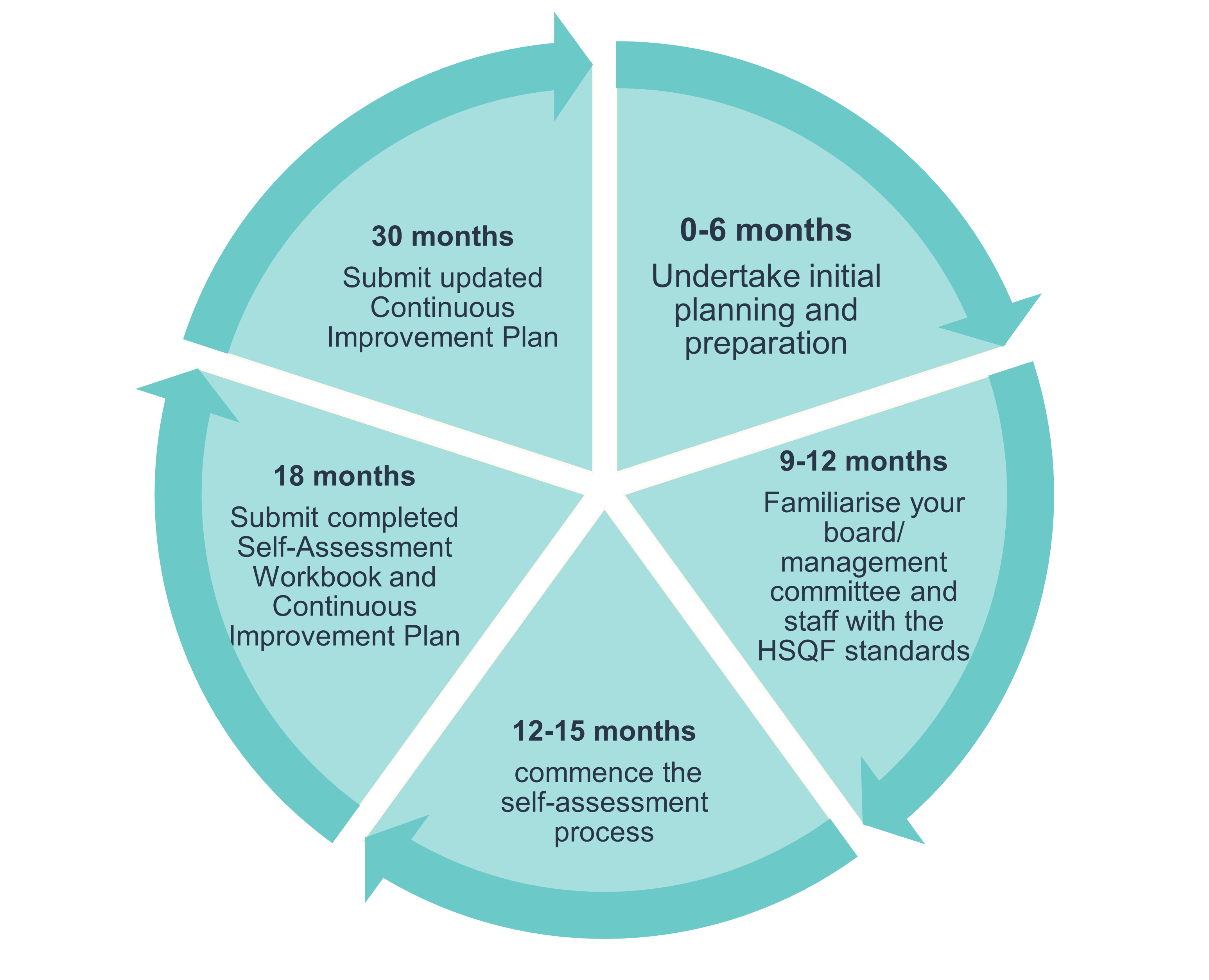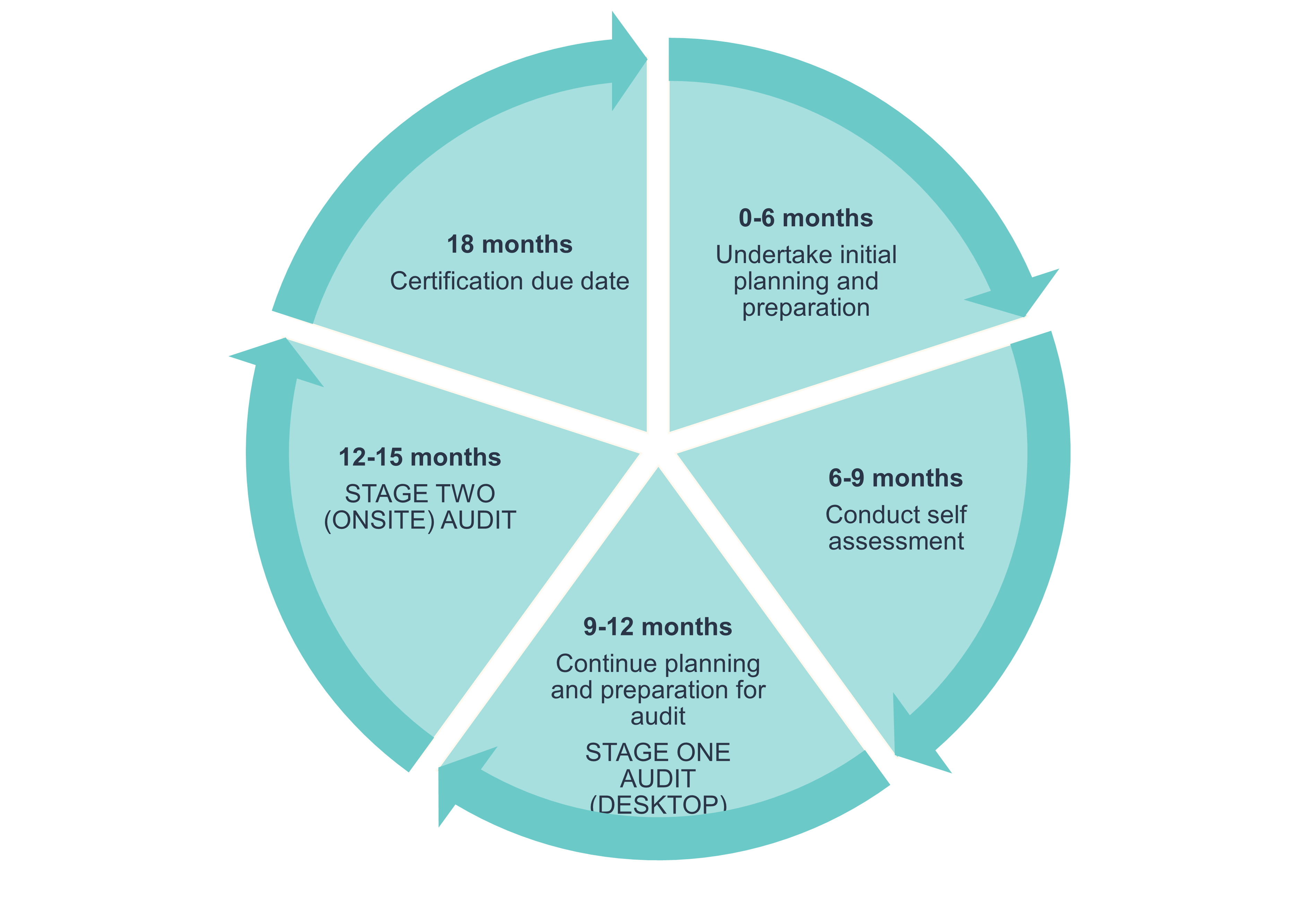Resources
Quality
What is the HSQF?
The Human Services Quality Framework, known as the HSQF, is a quality assurance framework for assessing the quality of services delivered in the human services sector in Queensland. This quality framework spans across several Queensland Government departments, so if you’re unsure if it applies to your organisation, you can check your service agreement.
The HSQF was developed by the Queensland Government in collaboration with the non-government sector to ensure consistency in service quality, increase public confidence in government funded service delivery, and maintain safety for people who use services in Queensland. The HSQF offers benefit to organisations delivering services, to the Queensland Government, and people who access services, including their families and carers.
The HSQF is made up of six quality standards:
- Governance and Management
- Service Access
- Responding to Individual Need
- Safety, Wellbeing and Rights
- Feedback, Complains and Appeals
- Human Resources.
These standards cover the core elements of human service delivery.
Services who are in-scope of the HSQF must demonstrate their performance against the standards in one of three ways: self-assessment, certification, or evidence of accreditation under another approved quality system. You will be able to find out what demonstration method is required of your organisation by checking your service agreement.
What resources are available?
If you’re preparing for a HSQF audit, have a self-assessment due date coming up or have just started your HSQF journey, it might seem like there’s a lot to do. QCOSS offers a range of free resources to keep things on track:
- HSQF Policy Templates and Resources
These are available on the QCOSS website and ready to use. Simply follow the checklist on the first page of each template.
- Quality Collaboration Network (QCN)
This is an exceptionally friendly and useful group to join. The QCN meets monthly – usually online – to discuss all things quality and compliance, with HSQF being a common thread. Particularly useful for small organisations, this network provides a group of peers to support your quality journey.
You can register for meetings via the QCOSS events page.
- Free HSQF e-learning course
Available via Community Door eTraining, the free HSQF e-learning module provides an overview of the Human Services Quality Framework, implementing quality systems, and how to facilitate continuous improvement.
- Bespoke support
Organisations can contact QCOSS for support at any point of the HSQF journey. If you have a question or if just want to check you’re on the right track, please get in touch with HSQF team at QCOSS.
HSQF Self-Assessment
Organisations required to demonstrate compliance with the HSQF through self-assessment have up to 18 months to do so. Refer to your service agreement to confirm your commencement date and to create a plan.
You will need to submit your self-assessment workbook 18 months after your HSQF commencement date. When completing your self-assessment workbook, you will be noting opportunities for improvement, and these will be captured in your Continuous Improvement Plan. Your Continuous Improvement Plan must be submitted with progress and updates next to your line items 12 months after your self-assessment due date.
Your next self-assessment will be due 18 months later. This is the self-assessment and continuous improvement cycle.

Your key documents:
- HSQF User Guide – Self-Assessable
- HSQF Guide to Self-Assessment and Continuous Improvement
- HSQF Self-Assessment Workbook (available in Word, PDF and Excel formats)
- Continuous Improvement Plan
The HSQF Self-Assessment Workbook requires you to consider each quality indicator, and what practices and processes you currently have in place which can be used as evidence that you meet a particular indicator.
These might include your current policies or other evidence suggested in the HSQF User Guide against that indicator. You are then required to give your organisation a self-rating for that indicator – Met, Partially Met, or Not Met. Any improvements that need to be made should be noted, and these need to be carried over to your Continuous Improvement Plan. Your organisation can then consider how you might make those improvements.
It’s important to consider all common and service stream mandatory requirements which are covered in the HSQF User Guide as Self-Assessable. Depending on your funding, there may be specific indicators you need to have evidence for.
HSQF Certification
HSQF certification can only be granted when an organisation has been assessed by an independent third-party assessor – known as a certification body – and deemed by them to be meeting the HSQF standards.
When an organisation is HSQF certified, it means it is meeting the HSQF standards and has a plan for continuous improvement to ensure it is always working on enhancing service delivery.
Engaging a third party to audit your organisation for HSQF certification requires some planning. Your organisation will need to engage a certifying body that is a good fit for your needs, is available during the timeframe needed, and comes within budget. We recommend engaging a certifying body well before your audit is due – this may mean speaking with a few providers to gain quotes and to get a feel for how well they will engage with your organisation.
An initial HSQF certification audit will occur in two stages – Stage 1 is a desktop audit, where the auditor will review documentation you submit, including organisational policies, to ensure you are ready for a Stage 2 audit – also known as an onsite audit.
HSQF certification is due 18 months after your commencement date. You can find this date in your service agreement or contact your contract officer to confirm.
The period leading up to HSQF certification will require some preparation, including:
- initial planning and scoping – who needs to be involved in the audit process, and what’s the organisation’s plan to ensure everything is ready?
- engaging a certification body
- conducting a self-assessment to identify things you may need to work on in preparation for audit
- having your Stage 1 (desktop audit) 12 months after your commencement date
- having your Stage 2 (onsite audit) approximately 15 months after your commencement date; and
- ensuring any outstanding issues identified during the audits have been actioned to achieve certification.

The HSQF User Guide – Certification, will be the key document to use throughout this process. This document lays out all the common or mandatory indicators for all organisations in-scope of the HSQF. It also outlines additional indicators you may need to demonstrate according to your funding stream.
For example: An organisation being funded to deliver a service to young people has a service agreement which stipulates a need to demonstrate compliance with the common indicators (yellow) as well as the Young People indicators (Pink).
The document lays out suggestions of what may be used as evidence for each indicator.

Once this process is completed, you will receive an audit report from your auditor, which will provide valuable feedback, such as what you can include in your continuous improvement plan. Many organisations will share their audit report with their board or management committee. The executive summary, in particular, gives the governance group a digestible snapshot of how the organisation is going in regards to quality and compliance.
Top tips
- Create a plan and start early
It’s really important to create a plan to demonstrate your organisation’s alignment to the HSQF standards.
From small to large organisations, multiple people across your team usually need to be involved. Policies need to be reviewed and updated, processes checked, and your governance body may need to approve improvements or changes – this work generally doesn’t happen in short timeframes. Auditors also engage with staff, the governance group, and clients – so it’s important that everyone understands the process and how they might be involved.
- View it as a positive process
While assessments might seem stressful at the time, quality processes, including self-assessments and audits, can be a great way to keep an organisation continually striving to be the best it can be.
Quality processes are beneficial for organisations, for clients and for funders, because they outline a consistent standard to which all parties expect work to be delivered.
The principles underpinning the HSQF include:
- respecting human rights
- social inclusion
- participation; and
- choice.
The HSQF assists organisations to bring those principles to life by giving some structure and guidance to the elements of service delivery that achieve those principles.
- Utilise the resources available and ask for support
There are many resources available to support organisations through self-assessment and/or certification. Firstly, begin with the resources available on the HSQF website. If you encounter difficulty or have questions, you can contact QCOSS for further support – it’s free!
Lastly, don’t underestimate the value of speaking to your colleagues in the sector. They are likely to have recently completed a self-assessment or audit or may be preparing for one alongside you.
You can join the QCN by emailing QCOSS.
- Engage a Certifying Body early (if you require certification)
Engaging a third party to audit your organisation for HSQF Certification requires some planning.
The process also costs money – so it’s vital to obtain a clear fee structure and quotes from a number of certifying bodies.
We recommend asking the certifying body you’re thinking of engaging about their experience auditing similar organisations or services, their availability, the structure and content of the audit reports, and what their services include. Remember, third-party organisations are an equal partner in the certification process – you should have a good working relationship with your certifying body where both parties are committed to quality service delivery.
Auditors are rarely available at short notice, so make sure you set some dates early on for your audit.
Do you have questions about the HSQF?
You may find the answers in this ‘Introduction to HSQF’ webinar, available on demand. Otherwise, get in touch with the QCOSS team for general HSQF support.
